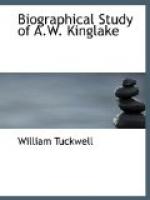By far the most charming of Kinglake’s articles was a paper on the “Rights of Women,” in the “Quarterly Review” of December, 1844. Grouping together Monckton Milnes’s “Palm Leaves,” Mrs. Poole’s “Sketch of Egyptian Harems,” Mrs. Ellis’s “Women and Wives of England,” he produced a playful, lightly touched, yet sincerely constructed sketch of woman’s characteristics, seductions, attainments; the extent and secret of her fascination and her deeper influence; her defects, foibles, misconceptions. He was greatly vexed to learn that his criticism of “Palm Leaves” was considered hostile, and begged Warburton to explain. His praise, he said, had been looked upon as irony, his bantering taken to express bitterness. Warburton added his own conviction that the notice was tributary to Milnes’s fame, and Milnes accepted the explanation. But the chief interest of this paper lies in the beautiful passage which ends it. “The world must go on its own way, for all that we can say against it. Beauty, though it beams over the organization of a doll, will have its hour of empire; the most torpid heiress will easily get herself married; but the wife whose sweet nature can kindle worthy delights is she that brings to her hearth a joyous, hopeful, ardent spirit, and that subtle power whose sources we can hardly trace, but which yet so irradiates a home that all who come near are filled and inspired by a deep sense of womanly presence. We best learn the unsuspected might of a being like this when we try the weight of that sadness which hangs like lead upon the room, the gallery, the stairs, where once her footstep sounded, and now is heard no more. It is not less the energy than the grace and gentleness of this character that works the enchantment. Books can instruct, and books can exalt and purify; beauty of face and beauty of form will come with bright pictures and statues, and for the government of a household hired menials will suffice; but fondness and hate, daring hopes, lively fears, the lust of glory and the scorn of base deeds, sweet charity, faithfulness, pride, and, chief over all, the impetuous will, lending might and power to feeling:- these are the rib of the man, and from these, deep veiled in the mystery of




